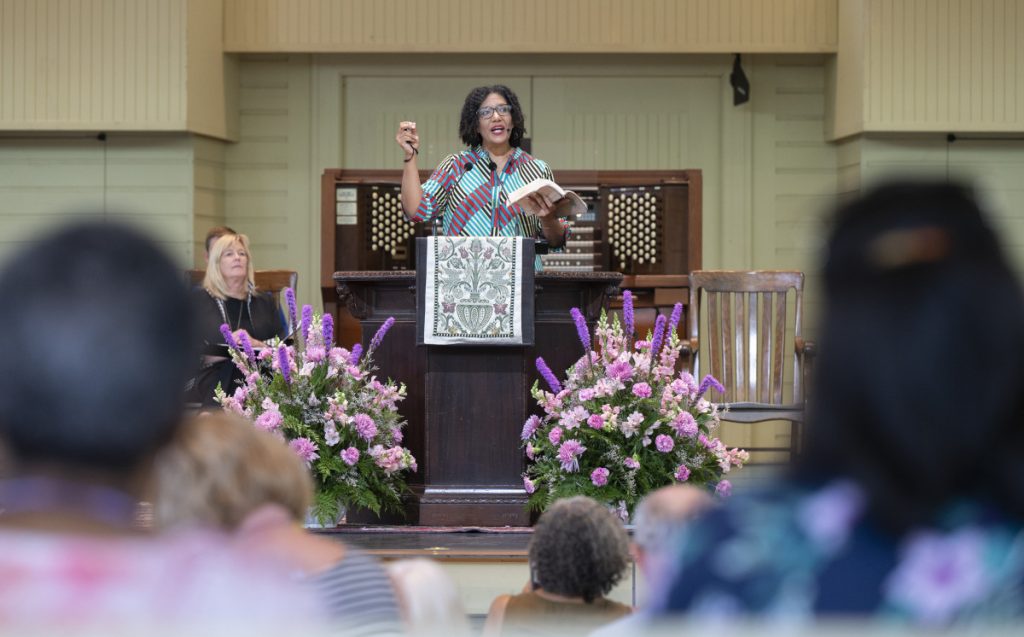MARY LEE TALBOT – STAFF WRITER

In 2017, Lisa Sharon Harper was invited to join 50 chaplains from around the world to a weeklong symposium on Robben Island in South Africa.
“We were invited to explore two questions: What is the state of people of color in a post-colonizing world? And what is the relation of that state and justice?” she said.
Harper preached at the 9 a.m. worship service Thursday in the Amphitheater. Her sermon title was “The Call to Repair What Race Broke in the World,” and the Scripture reading was Isaiah 58:1-12.
Before going to Robben Island, Harper was taken on a tour of Capetown. Her guides said, “You have to see the land in order to understand the story you are entering into.” Their first stop was District 6, an area that was multi-ethnic until 1966, when it was declared a whites-only area. The government sent in the army to round up people of color.
“They were dragged from their homes to a colored township,” she said. “There was such international outcry that the government razed everything and left it a field. The people have never returned.”
The second stop was Camps Bay, in the mountains overlooking the sea. “It was green and blue and had a beautiful view of the ocean,” Harper said. “There were huge homes and gold gilt garage doors, but there was razor wire around every home. Who was in prison here?”
The third stop was a colored township, where there were no trees and no natural green space. The last stop was a Black township with a sea of tin homes. “When people move in, they stop at the store and get a tin home kit and build their own house,” she said. “This is where the indigenous people are and the Africans who immigrate to South Africa.”
Harper continued, “They had just gotten their first porta-potties, first ever, and they rejoiced over having them. There is no running water or electricity except in light bulbs strung along the street. This was the state of South Africa 23 years after Apartheid ended. How can Christians live with this, the cognitive dissonance in the soul? Either you change it, or you adopt a theology that says Jesus had nothing to do with the situation.”
The prophet Isaiah wrote that the people of Israel were rejoicing as if they practiced righteousness and justice. “They live one way in church and another in daily life. They put God outside their relationship with the least of these,” Harper said to the congregation. “The reason to fast is to make you more sensitive to what is going on, more sensitive to sin and oppression.”
But the people who Isaiah wrote about were only serving their own interests. They oppressed their workers, did not pay a living wage and did not provide transportation. They even quarrelled among themselves and allowed the hungry to stay hungry. “They would point the finger at others to deflect responsibility,” she said. “And they would talk about justice — talk, talk, talk, talk, talk — but never do anything.”
The prisoners on Robben Island had to work in a lime quarry in the sun without shade. It was work with no purpose, meant to oppress the prisoners. “Mandela turned the work into a university, taught the men to read and they prayed together. It was the center of resistance, not just political, but resistance to the crushing of the image of God, the dehumanization of the men,” Harper said.
She continued, “Mandela called for forgiveness, which is an extension of resistance — to cut the tie between the oppressor and the oppressed. Forgiveness was for the sake of the Black and brown people. The message for white people was restitution, reparations in the United States, and repentance.”
There are no unilateral actions that Black people can take to bridge the wealth gap. Harper said, “America has to undergo a vast social transformation, a bold national policy to address slavery, Jim Crow and ongoing racism.”
In her forthcoming book, Fortune, Harper traced the economic consequences of this wealth gap through 10 generations from 1682 to the present. “Repair will require repentance, full repentance, national repentance, state repentance, local repentance, repentance by families and individuals. To choose not to repair is to choose not to repent. Repentance is true worship, when we speak and do justice,” she said.
Quoting Isaiah, she continued, “When we repent, our healing will spring forth, light will break forth, ruins will be rebuilt, generations raised, and then, only then, we can call ourselves repairers of the breach.”
As she has done every morning, Harper gave thanks to the Seneca and Erie Nations for being stewards of the land and blessed their elders. The Rev. J. Paul Womack presided. Mary Ellen Kimble, from a six-generation Chautauqua family, read the Scripture. The prelude was “Le Calme de la Mer,” by Tony Aubin, played by the Motet Consort: Barbara Hois, flute, Debbie Grrohman, clarinet and Willie La Favor, piano. Members of the Motet Choir sang “I Sat Down,” with music by Edward C. Bairstow and words from Song of Solomon 2:3b-4. Joshua Stafford, who holds the Jared Jacobsen Chair for the Organist and is director of sacred music, played “Sortie,” from “Pièces Posthumes,” by César Franck. The Alison and Craig Marthinsen Endowment for the Department of Religion provides support for this week’s services and chaplain.




